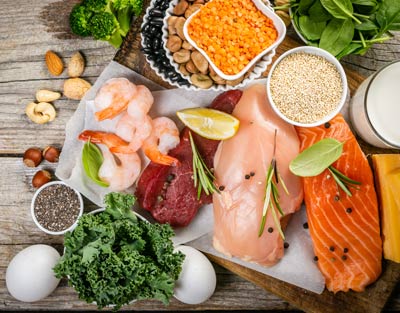
Whey protein: benefits and its relationship to vitamin B12
Proteins are present in every cell in the human body, so they are essential in the diet to repair damaged cells and produce new ones.
This is why they are especially important during the growth stage in children and adolescents, in pregnant women and also in sportsmen. Their basic structure is a chain of amino acids, which are essential for the proper functioning of the body.
On the other hand, whey protein (also called whey protein) is a derivative of the milk coagulation process and provides high amounts of essential amino acids, required for the functions of proteins in our body, as well as fats, vitamins and minerals. Thus, it is rich in nutrients.
Therefore, it is an excellent source of high quality protein and one of the best diet sources of protein available. In addition, it is highly digestible, being absorbed in the intestine quickly.
How can I get protein?

Foods rich in protein are broken down into amino acids when they are digested, which are necessary for the functioning of the human body. Essential amino acids are not produced by the body, so we must eat them through the diet. These amino acids are contained in:
- Animal sources: meat, milk, fish such as tuna and egg whites, among others.
- Vegetable sources: soybeans, beans, legumes, nuts like walnuts, oats or grains like wheat germ or quinoa.
Therefore, there is no need to eat animal products to obtain the necessary protein in the diet. It is also possible to take them through food or nutritional supplements, usually in powder form to mix with water, milk or to prepare shakes.
How much protein do I need a day?.
The recommended daily amount of protein intake for adults who do not do exercise on a regular basis is about 1 gram per kilogram of weight.
Instead, if a normal exercise routine is followed, the body requires a greater amount, around 1.2 to 2 grams per kilogram of weight.
It is recommended to distribute your daily consumption in the same way throughout the day and, in case of doing a moderate exercise session, take between 15 and 25 grams after finishing it in a time of up to 60 minutes.
An additional amount of protein would exceed the intake of more than 2 grams per kilogram a day, when the body is no longer able to process it.
Muscle mass and protein.
Over the years, the muscle mass volume decreases slowly resulting in an increase in fat. However, with an proper diet rich in protein foods and physical activity we can get this natural process to slow down.
For this reason, it is recommended the intake of quality proteins such as whey. It is effective against age-related muscle loss and also for muscle growth and maintenance, provided it is combined with strength training.
The nutrients provided by whey may help in muscle repair and increase the benefits of physical activity.

Whey protein for a healthy aging.
It is exactly for this reason that the consumption of whey protein can be beneficial in the elderly against the natural progressive loss of muscle mass. Its formulation and nutrients are necessary to reduce the loss of muscle during aging.
Vitamin B12 and Whey Protein
In addition to being a great source of protein, whey provides other nutrients and vitamins. These include a high content of vitamin B12.
This vitamin is involved in different processes of the body such as energy metabolism and the decrease of fatigue and tiredness, as well as the normal function of the immune and nervous systems. In addition, it also plays a role in cell division and in the production of red blood cells.
Therefore, maintaining proper levels of vitamin B12 is essential for the functioning of our body.
It has been shown that 10% to 15% of people over the age of 60 are deficient in vitamin B12, so a balanced diet that contains whey protein may be useful to increase vitamin B12 levels in the body. A healthy diet and lifestyle may be supplemented with whey protein.
How to take whey protein
Whey protein is easily added to the diet as it is usually in the form of a powder to be added to liquids or yoghurts, so it may be mixed with water, milk and also added to smoothies.
This protein form is better tolerated than other non-whey preparations, although taking too much of it, not only is it not useful for the body if the recommended daily amount is exceeded based on body weight and physical activity, but it can also cause digestive problems.





